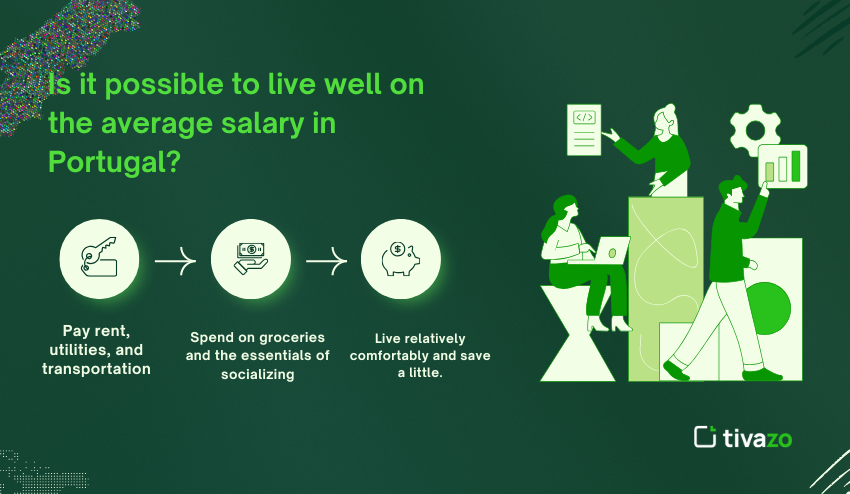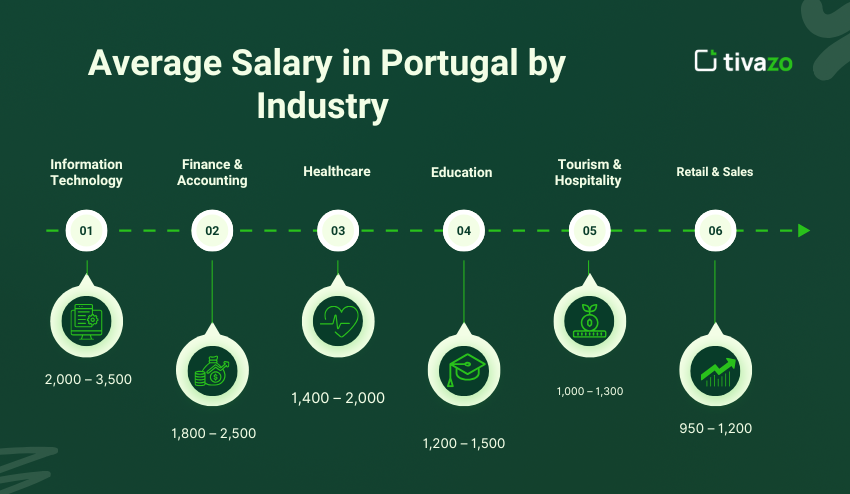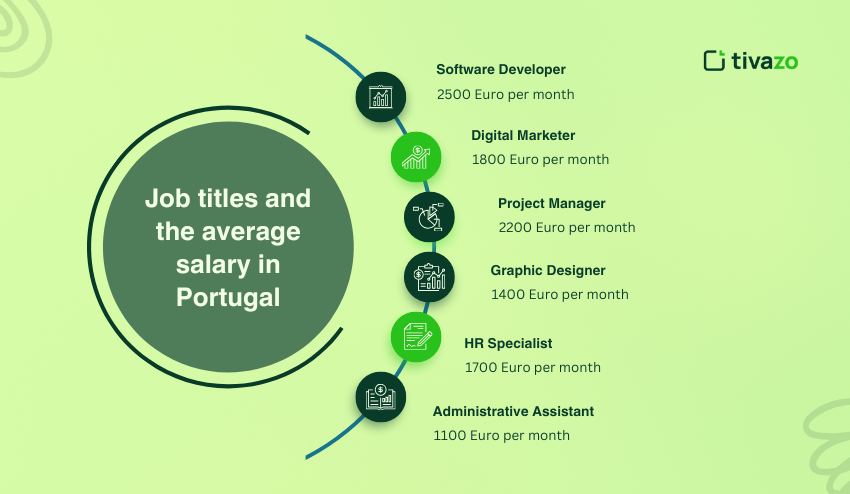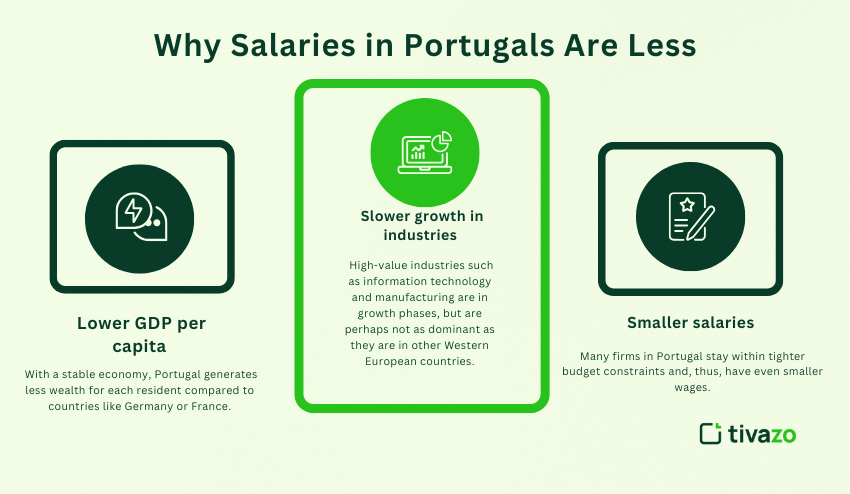It is important to know the average salary in Portugal if you intend to move there, expand operations, or hire remote talent from Portugal. Economic life in Portugal continues to evolve in 2025; accordingly, how much one can earn has also changed.
The average salary in Portugal is treated in depth in this report, which also contains a comparison of wages by industry, city, and job title; what a good salary is; and how relevant this is for companies using Tivazo’s time and productivity tools to plan for remote recruitment or salary benchmarking.
Whether you are an expat exploring new opportunities, a startup founder launching operations in Lisbon, or an HR leader building a global team, it is crucial to consider how the average salary in Portugal aligns with market comparisons. In this digital economy, salary transparency and real-time productivity tracking, offered by Tivazo, enable businesses to attract key talent while working within a budget and ensuring employee satisfaction, thanks to good performance data and competitive pay rates. Here is everything that one needs to know to firm their grip on a shifting job market in Portugal.
Key Highlights:
- Is it possible to live well on the average salary in Portugal?
- Is €1,200 a good salary in Portugal?
- Job titles and the average salary in Portugal
- Am I Able to live in Portugal on $1,000?
- Average Salary in Portugal Per Hour
- Why do Salaries in Portugal Tend to Be Lower Than Western European Salaries?
Is it possible to live well on the average salary in Portugal?
Yes, it is very possible, especially if you are not living in Lisbon or Porto, Portugal. On the average salary in Portugal, you can:
- Pay rent, utilities, and transportation
- Spend on groceries and the essentials of socializing
- Live relatively comfortably and save a little.
That said, living in a big city can put strain on the average salary in Portugal, especially with families.
In the smaller towns and more rural locations, a net earnings of €1,500 goes a very long way. A one-bedroom apartment can be rented for as low as €400/month. This gives you an ample amount for transportation, food, and even some fun money! Public transportation is reliable, and the costs are lower than in bigger countries, and even better, effective healthcare, schools, and other essential services are mostly subsidized by the government, which contributes to relieving strained finances.
However, if you are in Lisbon or Porto, you have more opportunities but at a higher cost. Rent alone will cost you from 50–60% of your net income if you are not sharing accommodation; more if you are living with your family. The ability to entertain a comfortable lifestyle for any individual, let alone a family, is harder if earning only the average salary in Portugal, unless you have lots of savings or other income.
That is where Tivazo comes into play! For remote workers & digital nomads, committed to earning income through foreign means. Our time tracking and performance tools ensure productivity.

What Do We Earn on Average in Portuguese Land in 2025?
The average salary in Portugal, as of 2025, is currently €1,500, considering the income after tax. Depending on the region, industry, and level of experience, it will range around €18,000 per annum.
| Income Metric | Value (2025) |
| Gross Monthly Average Salary | €1,700 – €1,800 |
| Net Monthly Average Salary | €1,450 – €1,500 |
| Minimum Wage (Monthly) | €820 (Net) |
| Median Salary | €1,350 – €1,400 |
Another important factor bearing on the average salary in Portugal is industry and geographic location.
Can I Live in Portugal for $1500 a Month?
Yes, you can live in Portugal for $1,500 a month, especially in smaller cities or rural areas. The average salary in Portugal is about €1,500, net, per month (approximately $1600), so many locals live on this amount. If your income is $1,500 per month, you will closely identify with this national average.
Outside Lisbon and Porto, rental prices are around €350 – €600; groceries, utilities, and local transport are very cheap. You may not be living in luxury, but you can live modestly and comfortably.
In larger cities with expensive living, $1,500 per month is not going to go as far. Just in rental costs alone, you will likely eat up much of the $1,500 you have budgeted. With an understanding of how an average salary in Portugal translates into real life, your budget will be informed and allow you to move closer to balance in your remote international working life. Even remotely, it is difficult to operate globally all alone, which is why German design, Tivazo, helps users use the concept of the socioeconomic average in Portugal to live more comfortably.
Average Salary in Portugal by Industry
Some sectors pay notably more than others. Here is a breakdown of the average salary in Portugal across the main industries:
Industry-Wise Salary Comparison
| Industry | Average Monthly Salary (€) |
| Information Technology | 2,000 – 3,500 |
| Finance & Accounting | 1,800 – 2,500 |
| Healthcare | 1,400 – 2,000 |
| Education | 1,200 – 1,500 |
| Tourism & Hospitality | 1,000 – 1,300 |
| Retail & Sales | 950 – 1,200 |
Since Tivazo is in HR and SaaS, it can use this data to assess competitive salaries for local hires or Portuguese remote employees.

Is €1,200 a good salary in Portugal?
Whether €1,200 a month can be considered a good salary in Portugal is primarily based on where you live and your lifestyle. Compared to the average salary in Portugal, which is estimated at around €1,500 net, monthly in 2025, €1,200 may be a little below average; however, it is doable in many places in Portugal.
Here is how €1,200/month of salary compares:
In smaller towns or rural areas:
- Rent can be as low as €300–€500/month.
- You’d pay for daily expenses (food, utilities, and transport) less frequently.
- You can live modestly and save something.
In Lisbon, Porto, or the Algarve:
- Your rent may account for 50-70% of your income.
- There is little room to eat out, travel, or save anything personally.
- It may be tight for families and difficult for those who have debt.
As a comparison to the average salary in Portugal, €1,200 a month is most appropriate for single people living in low-cost living areas. For remote workers and employers with Tivazo, this assessment assists in determining both a fair wage and managing expectations for performance and well-being.
Job titles and the average salary in Portugal
Here are some of the most common jobs in Portugal and their salary scales:
| Job Role | Pay (€) per month |
| Software Developer | 2500 |
| Digital Marketer | 1800 |
| Project Manager | 2200 |
| Graphic Designer | 1400 |
| HR Specialist | 1700 |
| Administrative Assistant | 1100 |
Hiring globally through Tivazo’s productivity tools? Knowing these benchmarks makes sure you make fair and attractive salary offers to key top-priority talent.

Am I Able to live in Portugal on $1,000?
Living in Portugal on $1,000 per month is possible, but it comes with grave compromises. In contrast, the average wage being paid in Portugal at present is around €1,500 net per month in 2025. Hence, $1,000 (ratably €920) is less than what is shared by most locals.
The dollar would be enough to take care of basic needs in smaller towns or rural areas like Évora, Braga, or the Azores. Here, rent can be around €300–€40,0 and public transport is cheap as well. If you are miser, $1,000 seems doable, provided that you do not eat out too many times.
Go to Lisbon or Porto, and $1,000 will not do. To eat, be insured, and keep alive would hardly leave any bucks after rent costs~much less an hour for entertainment! Better would be for digital nomads or freelancers who earn foreign income and, thereby, live on the lower cost of living in Portugal.
Knowing how much the average salary is in Portugal allows you to know where and how you can live on a tight budget–and Tivazo can help you keep track of your expenses, productivity, and work-life balance while working remotely.
Foreigners and the Average Salary in Portugal
There are cases when foreigners and expats earn more than the Portuguese standard, such as:
- Tech and IT
- Startups in Lisbon
- Multinational firms
This is a gap seen mostly in tech jobs. For example, the average salary of a foreigner is 10-15% higher in a tech role when compared to a Portuguese. The gap, however, becomes null for the hospitality and retail sectors.
The gap is all about the demand for skills and international standards of hiring. Foreign nationals with the skills in demand—like software developers, data analysts, and digital marketers—usually negotiate a salary based on international standards and not the standards of merely one country. On the other hand, those posts in customer service, tourism, or restaurant jobs typically earn close to the local average salary in Portugal.
Language matters, too—those expats who are fluent in Portuguese have more job options and can get better-paying jobs. At Tivazo, through our work with remote teams in and outside Portugal, we learned that rewarding in accordance with productivity and skill sets rather than simple geography enriches retention and fairness. Using the Tivazo platform, employers are able to keep their pay competitive and fair, whatever nationality the employees.
Average Salary in Portugal Per Hour
Under the assumption of an average 40-hour working week, the average hourly wage according to 2025 data in Portugal is approximately €9 to €10 for full-time workers, considering an average monthly salary of around €1,500 net. The range of payment, however, widely varies according to industry, location, and job type.
Examples:
- Tech and finance professionals may demand between €15 and €25 per hour.
- Meanwhile, jobs in retail or hospitality tend to pay between €5 and €8 an hour.
- Those working as freelancers or remotely might ask for even more, especially when working for overseas clients.
Compared to other countries of Western Europe, the average salary per hour and hence hourly wages in Portugal can be considered low, which is why the country has been dubbed an outsourcing and remote work hub. Such data is helpful to companies using Tivazo in setting their hourly rates fairly with respect to Portuguese freelancers and remote workers; productivity is ensured to be equitably compensated. In a remote team, it is about salary transparency and time tracking.
Why do Salaries in Portugal Tend to Be Lower Than Western European Salaries?
Some of the factors include:
Lower GDP per capita
With a stable economy, Portugal generates less wealth for each resident compared to countries like Germany or France.
Slower growth in industries
High-value industries such as information technology and manufacturing are in growth phases, but are perhaps not as dominant as they are in other Western European countries.
Smaller salaries in the private sector
Many firms in Portugal stay within tighter budget constraints and, thus, have even smaller wages than their more multinational counterparts in this part of the world.
Nevertheless, the low salary in Portugal is steadily rising. This is an effect of government initiatives, EU funds, and increased foreign investments, especially into startups, tourism, and renewable energy, creating jobs and gradually increasing salaries.
As more companies start employing the remote talents of Portuguese workers, such platforms as Tivazo ensure that fair wages are maintained through the use of time tracking, productivity monitoring, and transparent peer reviews. With an ever-changing economy, higher wages therefore gain potential across the entire nation.

Tivazo’s advice for employment in Portugal
Hiring in Portugal? Here’s what Tivazo suggests:
- Do some benchmarking based on the average salary in Portugal.
- Use Tivazo for attendance tracking and assessing work types.
- Offer pay that is competitive, but can also be sustained.
- Provide local benefits like food allowances and/or transport allowances.
- Use our smart dashboards to track employee engagement.
You can build high-performing, motivated teams using salary insights and smart tools.
Conclusion
The average salary in Portugal levels in Portugal provides a relevant summary of what people can expect to earn in today’s economy as both for locals and expatriates. Salaries here may be lower than in neighboring countries like Spain or Germany, but the lower cost of living—in many cases, especially in smaller and mid-size cities—provides a competitive lifestyle. It is also helpful to note that because Portugal is creating a balanced economy of salary and cost of living, new remote workers or team members located in Portugal as well as startups and bigger international players, are all attracted to operating there and developing distributed teams.
For companies using the Tivazo platform, understanding average salaries in Portugal is an important step in developing reasonable compensation packages that align with productivity and budgets. The Tivazo platform simplifies managing employee performance and remote teams. And it makes creating a culture of transparent pay easier for employers and employees alike.
Combining viable salary data with the use of smart productivity tools enables companies to create engaged employees who stay long-term, especially in a positive economic environment like Portugal’s. Understanding average salaries in Portugal is not just data; it provides future savvy teams working in an efficient manner with a happy working environment.
Can I live in Portugal with $1500 a month?
You would be able to retire comfortably in Portugal with an monthly income between $1500 -- 2000. For some people the Social Security payment alone was enough to cover their cost of living.
Is €1,200 a good salary in Portugal?
The average take home pay after tax is approximately €1,200 a month, and the average local in Portugal can manage to live on less than €800 a month. Also the average couple living in one of the smaller cities in Portugal will pay approximately €1,700 a month living expenses where as; if they were living in one of the larger major cities like Lisbon, they could expect to pay over €2,000 a month.
Average Salary in Portugal Per Hour
If you break down the average minimum monthly wage of €1,200 per month to hourly wage you could expect to be paid about €4.40 per hour with a guaranteed two months each year extra bonus. Considering the bonuses, now the average hourly minimum wage in Portugal is about €5.14 per hour.




